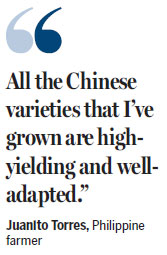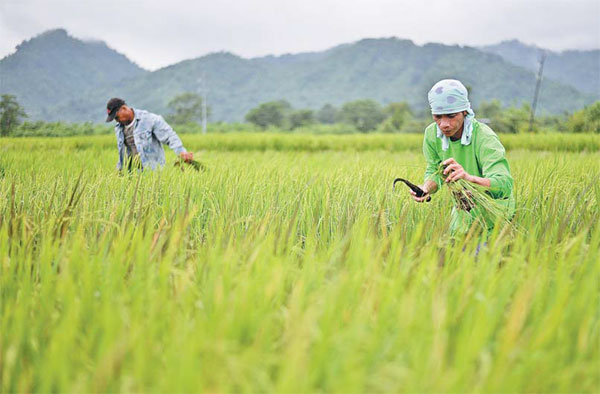Agricultural cooperation a boon for Filipinos
PhilSCAT offers information, technology to increase productivity and profitability for agricultural industries improvement
MANILA, Philippines - Juanito Torres has spent almost his whole life growing crops in the Philippines. Since 2015, the 79-year-old farmer was even more dedicated as he started growing Mestiso 38, a new hybrid rice variety introduced by Chinese agricultural experts.
"I harvested 334 cavans for 1.5 hectares of land (translated to 12.69 metric tons per hectare) in one season, highest yield I have ever achieved," said Torres.
|
Philippine farmers work in a rice field in Laguna province, south of Manila. Noel Celis / For China Daily |
Torres is part of the hybrid rice technology program initiated by the Philippine-Sino Center for Agricultural Technology, or PhilSCAT.
As a model farmer in his neighborhood, he was chosen to grow the hybrid rice variety as a demonstration for his fellow farmers.
During the harvest season, PhilSCAT will organize farmers' field day, on which hundreds of farmers are invited to see Torres' achievements and learn about technologies and machinery usage relating to hybrid rice cultivation.
Torres, on the other hand, get the seeds for free and can keep the rice for himself.
He is not the only famer growing Chinese hybrid rice varieties on demonstration farmland organized by PhilSCAT. This year, the center has established demonstration sites in five major rice growing provinces, which covers an area of 50 hectares in total.
Farmers have been recommended by local communities to grow Chinese hybrid rice varieties and monitor its production.
PhilSCAT was established in 2000 by the Chinese and Philippine governments with an initial $5 million donation from China and the Philippines respectively.
Through the joint efforts of Chinese and Philippine experts, PhilSCAT has built up a bridge and linkage in the demonstration trial of quality hybrid rice varieties, showcasing of advanced and practical agro-machinery and training and promotion of agricultural technologies.
Apart from demonstration, the center also brought in more than 150 varieties to test their adaptability in the Philippines. So far, four varieties including Mestiso 38 have passed the Philippines' National Rice Cooperative Tests and are ready to be sold in the market.
"All the Chinese varieties that I've grown are high-yielding and well-adapted," said Torres, adding that many neighbors and friends asked him where to purchase those seeds.
"We farmers love Chinese hybrid rice varieties, and we really want to be able to buy the seeds in the market," he said.

Cheng Liangji, Chinese co-director of PhilSCAT, said the center is commercializing Mestiso 38 to make the variety accessible to as many farmers as possible.
In south Philippines, Dosepco Davao Oriental Seed Producers Cooperative has signed an agreement with PhilSCAT to produce Mestiso 38, under which PhilSCAT assigns experts to teach the cooperative the way to produce the seeds, collecting minimal fees that only cover travel expenses.
So far, the cooperative has produced 18 tons of Mestiso 38 seeds, enough to grow 900 hectares of rice.
Cheng said it is only the center's first step. PhilSCAT will spare no efforts in making hybrid rice varieties available for as many farmers as possible.
Another important objective of PhilSCAT is to make available relevant technologies on biogas technology and energy generation in local households and farms.
Starting in 2013, the center has set up biogas household digesters in northern Philippine's Nueva Ecija province.
Nora Mendoza from Science City of Munoz is especially grateful of the program. "Two of my major problems are solved because of biogas technology - first is the odor from my piggery and second is my cooking gas consumption," said Mendoza.
She said her family of six are no longer buying liquefied petroleum gas because they can cook food with biogas, and the odor was minimized, to her neighbors' surprise.
"I want to thank PhilSCAT and the other agencies that make this project possible," said Mendoza, who also uses the gas for lighting when there is a power failure.
By showcasing the usage of biogas facilities to every party interested, she can use the facility for free. After she fulfills her demonstration responsibility, she will be able to own the facility.
In the meantime, experts from PhilSCAT are providing her technological training in time and support so that she can operate the facility with ease.
Apart from farmers, hundreds of agricultural experts, researchers and university professors took training courses in Chinese universities with PhilSCAT's help.
"I've sent more than 100 people from our university to China for training courses," said Firma Viray from Central Luzon State University.
In charge of the exchange and training programs, Viray considered the training in China a good opportunity for faculties to open their minds and improve themselves.
"They come back with more advanced technologies to share with their students, as well as the Chinese culture," she said.
Attaining rice self-sufficiency has long been the Philippine government's priority.
Many factors have been considered to hinder food sufficiency such as land conversion, deteriorating irrigation systems, corruption, inappropriate policies, lack of farm credit and backward farmers. A population of more than 100 million people is also a challenge as the demand for food is huge.
PhilSCAT's ultimate goal is to help modernize the country's agriculture and further support the government's goal of food sufficiency.
Working for more than a decade in the Philippines, Cheng Liangji found similarities between China and the Philippines.
"To rice-eating nations like both our countries, rice is more than just food. It is the very basis of our culture," said Cheng, who added that this makes farmers the most indispensable member of society.
"I have seen how PhilSCAT continues to ascend into a higher level of educating the farmers with technological innovations and tools that will equip them to increase their yield and income and I am very proud that I belong to the pool of experts who provide such services to them," said Cheng.
Emmanuel Sicat, director of PhilSCAT, believes that the center's greatest contribution to Philippine agriculture is raising awareness of various agricultural industry stakeholders.
"When they see for themselves how much agricultural mechanization and other technologies can help them harvest more, they begin to demand them. That's a very promising sign," said Sicat.
Xinhua
(China Daily 05/15/2017 page43)















